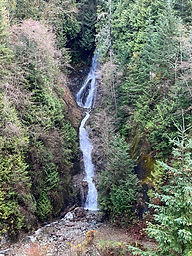Invasive Species Mitigation
- kc dyer
- Sep 3, 2023
- 3 min read
Education, Prevention the Keys to Success

Invasive species are on the rise in the Sea to Sky region, according to Clare Greenberg of the Sea to Sky Invasive Species Council (SSISC). In the introduction to Greenberg's presentation before Lions Bay Village Council on July 18, she noted the organization's long association with the Village, and outlined their plans to ramp up education and outreach.
The SSISCs mandate is to minimize the threat of invasive species that impact the environment, the economy and human health along the Sea to Sky corridor. Residents may have seen signs posted around the village about the presence of invasive species such as Giant Hogweed and Spurge Laurel, both of which can be incredibly toxic to humans and other animals. The Watershed contacted Greenberg to learn more about the impact of invasive species in Lions Bay.
Greenberg, who has worked with the SSISC since 2013, says that it's not only plant life that can invade and overtake local species. A case in point is the European Green Crab, which is of particular concern at the moment. Native to Europe and North Africa, the crab is considered one of the world's ten most invasive species, and has established itself in coastal Washington state and on the West coast of Vancouver Island. This invasive crab competes with native species for prey and has the potential to upset the overall balance of marine ecosystems. It's also known to disrupt eelgrass beds, which are important habitat for young salmon. "Recently this invasive species has been spotted south of Vancouver in Boundary Bay, and on Salt Spring Island near the entrance of Howe Sound," says Greenburg. "We are concerned that it may be making its way into Howe Sound."

To help address this concern, SSISC began monitoring Howe Sound for this invasive species in 2021. This volunteer program, now in its third year, takes the prevention approach. "The program requires a high level of collaboration between partners, including Fisheries and Oceans Canada (DFO). So far, no crabs have been observed in Howe Sound, and we hope to keep it that way," Greenberg says.
Since the inception of SSISC in 2009, Greenberg says she has seen the number of partners the council works with and the programs they offer expand significantly. "Landscape-scale invasive species management requires everyone to be involved, and our efforts to bring many and varied partners to the local and regional planning table, enabling us to see some great results. Last year alone, our field team visited 367 previously treated invasive plant sites that showed no signs of regrowth."
Greenberg says SSISC has a special interest in working with kids and teens. "We love to interact with kids at events like farmers markets and school visits. Our staff have worked with many children and school groups over the years, pulling weeds and playing educational games." Youth are encouraged to find out more via the organization's special webpage HERE, and resources and information are also available to teachers and educators HERE.
Volunteers and interested residents can reach out or report sightings of potentially invasive species in Lions Bay HERE.
The most important takeaway for Lions Bay residents, according to Greenberg, is education. "Learn how to identify invasive species in your area, how they spread, how to properly control them and prevent further spread. If you spot an invasive species, make sure you report it and help spread the word by talking to your neighbours and friends. Many hands make light work!"
Questions or thoughts about invasive species in the Village? Leave your comment below, or email us at editor@lionsbaywatershed.ca


Comments